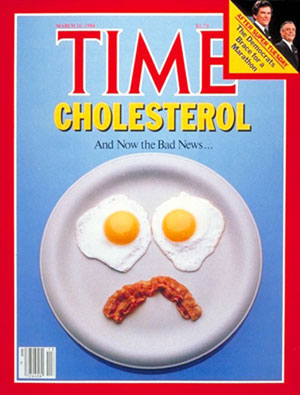The reason Big Pharma and big food want you to think eggs are bad – and why they are not

Time Magazine cover from 1984, demonizing eggs to promote
the cholesterol theory of heart disease and fuel a multi-billion dollar statin drug
industry.
Ever since the cholesterol theory of heart disease was created
during the 1970s and 1980s, eggs have been vilified as a potential threat for not only heart
disease, but more recently even diabetes.
Official institutional warnings of egg consumption continue,
even as the cholesterol theory of heart disease is crumbling with the emerging unbiased science
proving otherwise.
Diabetes type 2 has become epidemic in cultures that have
embraced western processed food diets. There have been some epidemiological surveys that have
managed to associate egg consumption with an increased risk of diabetes.
Those seem to be publicized more than studies that have the
different conclusions. Finland has recently shown other conclusions with both a large, unbiased
epidemiological study and a follow-up study that analyzed metabolic features among egg
eaters.
Both concluded that those who enjoy eggs in their diet have
less risk of diabetes.
The Epidemiological Finnish Study That Went Against
Official Nutritional Recommendations
An epidemiological survey study inspires the often repeated
adage “association does not mean causation.” But association serves as an
impetus for “further studies” that become laboratory and clinical in nature.
The following two studies illustrate this very dynamic, both
within the same Kuopio Ischaemic Heart Disease (KIHD) Risk Factor Study cohort.
In 2015, researchers of the University of Eastern Finland
concluded their tracking of 2,342 men, aged 42-60, from the KIHD cohort assembled during the
early 1980s to analyze dietary effects on chronic diseases and heart health.
The title of their report that was published by the The
American Journal of Clinical Nutrition in April of 2015 is Egg consumption
and risk of incident type 2 diabetes in men: the Kuopio Ischaemic Heart Disease Risk Factor
Study.
Records of medical examinations taken at the four and 11-year
points, and at this cohort’s 20-year endpoint (2006-2008), were made available for
researchers worldwide. So far the KIHD project has been used for 500 international
studies.
After already using this cohort to determined that egg
consumption did not create cardiovascular disease, the Eastern Finland University researchers
decided to analyze the glucose measurements and insulin resistance markers taken from
examinations every few years until the cohort’s endpoint 20 years later.
Those who were scrutinized for metabolic disorders, insulin
resistance, and serum glucose levels, all markers of pre-diabetes and diabetes 2, consumed one egg a day on average.
This is a higher egg count than many other similar studies.
From the study’s text:
“… because the evidence on the impact of egg
consumption on the risk of T2D [type 2 diabetes] is limited and mixed, we investigated the
association between egg consumption and risk of incident T2D in middle-aged and older men from
eastern Finland.
We previously showed that egg consumption was not
associated with carotid atherosclerosis or risk of myocardial infarction in this study
population.
In secondary analyses we also investigated the association
of egg consumption with plasma glucose, serum insulin, and serum C-reactive protein (CRP) at
baseline and in a subgroup after 4 y [years] of follow-up.”
If you go to the full study text available
here, you’ll discover the details that led to these researchers concluding:
Higher egg intake was associated with a lower risk of T2D
[type 2 diabetes] in this cohort of middle-aged and older men.
Somehow, an association between high cholesterol serum
readings and diabetes had been made in the past by the “cholesterol creates cardiovascular
disease” crowd.
The mounting evidence that cholesterol is vital for health and
that people with low cholesterol have more health issues and shorter lives than those with high
cholesterol is largely ignored when it comes to corporate-sponsored “mainstream”
media coverage.
Because egg yolks are high in cholesterol, eggs remain a wrong
target with the mainstream media and official nutritional institutions who are in lockstep with
the cholesterol con.
To now admit that the science does not support the cholesterol
theory of heart disease would be akin to destroying Big Pharma’s most profitable line of
drugs: statins.
Combining the cholesterol/saturated fat theory of heart
disease with obesity and metabolic disorders leading to diabetes was probably created and
exploited as a distraction from the real dietary issues creating these unhealthy conditions:
Processed trans-fatty acid processed vegetable oils used to replace healthy saturated fats and
heavy sugar consumption.
Recent Serum Analysis Study Confirmed the Outcome of
the Prior Epidemiological Study
The University of Eastern Finland then followed the 2015 study
to actually measure metabolic markers that signal metabolic dysfunction or metabolic syndrome
leading to diabetes 2 to further understand how eggs help prevent diabetes 2 instead of causing
it.
This study is titled Metabolic
Profiling of High Egg Consumption and the Associated Lower Risk of Type 2 Diabetes in
Middle‐Aged Finnish Men. It was published on December 12, 2018, in the journal
Molecular Nutrition.
This study involved a smaller number of participants from the
large KIHD cohort, 239, who were divided into four groups from their baseline serum metabolic
readings to their outcomes after the 20-year study.
The four groups were divided according to those who ate more
eggs, one a day, or fewer eggs, two per week, and whether each group remained healthy or
developed type 2 diabetes over the length of this 20-year KIHD study.

University of Eastern Finland researcher Stefania Noerman
stated:
“The purpose of the current study was to explore
potential compounds that could explain this [inverted] association using non-targeted
metabolomics, a technique that enables a broad profiling of chemicals in a
sample.”
The researchers used non-targeted LC‐MS‐based
metabolic profiling which uses ultra performance liquid chromatography coupled with mass
spectrometry (UPLC-MS). It is a powerful technique to investigate metabolism.
Potential compounds such as baseline tyrosine levels, along
with an unknown hexose‐containing compound and other predominant metabolites, can predict
type 2 diabetes cases. The researchers discovered an inverse relationship.
The group that consumed more eggs had lower diabetes
predictive metabolite readings than the group that ate fewer eggs. The researchers
concluded:
“Our current findings may underline some potential
metabolites that can explain how egg intake is associated with a lower risk of T2D [type 2
diabetes].”
The only thing that remains that allows those who enjoy eggs
to feel comfortable is how to choose the eggs that are the healthiest. The cheapest, most common
eggs are from mass producers who confine their hens to cages in large warehouses. And they are
the ones that are most often recalled for salmonella.
Look for eggs from cage-free and pastured chickens.
yogaesoteric
January 24, 2020
